- Home
- Carolyn Keene
Famous Mistakes Page 3
Famous Mistakes Read online
Page 3
“Make sure you look under things. Even the smallest clue could help us find the person who did this,” I reminded everyone as I focused my eyes intently down, looking for anything that seemed like it didn’t belong to a middle-aged stand-up comic. I carefully shook out the pants that were strewn across my way. I was completely focused on the two square feet of carpet in front of me.
After a moment, Ned spoke up. “You know, these notebook pages aren’t torn that small. I think we could put them back together.”
“Don’t tease me, Ned,” Brady answered. “I can’t take another disappointment right now.”
“No, I’m serious,” Ned said. “I’m pretty good at puzzles.”
“He’s being modest,” I added. “He’s really good at puzzles. It’s a tradition in his family that they do a giant jigsaw puzzle every year over the holidays. And by ‘giant’ I mean like over five thousand pieces.”
“Yeah, and we do the expert-level ones,” Ned continued. “The ones that are approximately ninety percent sky or ocean, so each piece is blue with very little distinguishing it from the others.”
I picked up a scrap of the notebook paper and examined it. It was about half an inch in size, but you could clearly make out the letters st on it. It wouldn’t be easy to put it back together, but it was possible.
“I think he could do it,” I said.
“Here,” Ned said, taking the recording equipment out of its box. “Put all the notebook pieces you find in this box, and I will work on putting the pages back together after we finishing searching the room.”
We got back to scouring our quadrants for clues, stopping only to put notebook scraps in the box. After a while my arms began to ache and my eyes started swimming from staying focused on a small spot for so long.
“There’s nothing in my quadrant,” Joe said, standing up and stretching his back.
“Mine either,” said Brady.
“Sorry, Nancy,” Ned chimed in. “I don’t see anything either.”
I hadn’t had any luck either, and I was going to give up when suddenly my own words echoed in my head: Look under things.
“The bed,” I said.
“Brady and Joe searched the bed,” Ned said, confused.
“But they didn’t search under it,” I said. “Come on!” I lifted up the bed skirt, but it was too dark to see anything. I pulled out my phone, turned on its flashlight function, and shined it under the bed. I swept it from left to right, like I had seen the spotlights on police helicopters do on the news when they were searching for escaped suspects. The light caught something that flashed, but I couldn’t make out what it was.
“There’s something under there!” I exclaimed.
“What? What is it?” Brady asked, rushing to my side.
“I’m not sure,” I said, stretching my arm underneath the bed. I reached as far as I could, but I still couldn’t grasp it.
“Let me try,” said Brady, shoving his arm under the bed. I watched him flail his arm, his face puckered in concentration, and I realized he was holding his breath.
“Got it!” he exclaimed, exhaling with a loud gasp.
He pulled his hand out, his fist clenched around the mystery object. Slowly he opened his fingers, revealing a large gold button about the size of a nickel with an anchor embossed on it, so it stood out from the button three-dimensionally.
“That looks like a button from a blazer,” I said.
“Is it one of yours?” Ned asked Brady.
Brady laughed. “Did any of the clothes you saw strewn all over this room look like I would (a) wear a blazer or (b) wear anything that had an anchor on it?” He didn’t wait for any of us to respond. “No, I am strictly a jeans and black T-shirt kind of guy. If it gets chilly, then perhaps I will don a black sweater.”
“Then this is a clue!” Ned exclaimed. “Our culprit wore a blazer and lost a button!” I gave him a look, and Ned knew me well enough to know exactly what it meant.
“What?” Ned asked. “Why isn’t this a clue?”
It was one of the things I liked best about my relationship with Ned—how well we could communicate without speaking.
“Well,” I explained, “it’s more that we don’t know that it’s a clue. This is a hotel room. For all we know, it belongs to a previous occupant.”
“Then what was the point of spending half an hour crawling around on my hands and knees?” Joe asked huffily.
“It’s still good,” I said. “If we find someone in the course of our investigation who is missing an anchor button, we know that they’re probably involved. We just can’t rule anyone out because they don’t have a blazer with a missing button.”
Joe sighed. “I have to get back to my office. Brady, if you change your mind about the extra security, let me know. Nancy Drew, you have until six o’clock to convince me you have the suspect.” He left the hotel room.
I felt bad that I hadn’t convinced him that it wasn’t a waste of time to search the room. Detective work isn’t glamorous; there are a lot of dead ends and wrong theories before you solve the case, but each dead end is important, because it eliminates one possibility of what happened. It’s just like taking a multiple-choice test: every answer that you know is wrong gets you closer to the right answer. I wish I had been able to explain better that just because we didn’t know the button definitely was important, that didn’t mean it definitely wasn’t.
I turned to Ned. “I think it’s time we go interview some of these members of RHVRA and see if they know anything.”
Ned looked down at the box of notebook scraps we’d collected. “Do you mind seeing if George and Bess can go with you?” he asked. “It’s just that I think putting this notebook back together could take a really long time, and I’d like to get started on it. Brady’s going to help me.”
“Sure,” I replied. “That makes sense. But what about your interview for NED Talks?”
Ned glanced at Brady, who was on the other side of the room, gathering some of his belongings from the floor. “I think he might be open to answering some questions as we’re working.”
“Sure,” I replied. “That makes sense.”
“Thanks, Nancy,” Ned said. “Let me know what you guys find.”
“You got it. Good luck with your hardest puzzle yet,” I told him before turning toward Brady. “Bye,” I said. “I’ll be in touch as soon as I have something to report.”
“Thanks. Talk soon.”
I stepped into the hall, pulled out my phone, and dialed George’s number. She answered before the end of the first ring.
“Nancy!” she yelled so loudly that I had to pull the phone away from my ear. “I just finished my shift. How’d it go? Did my microphones work? Wait. Don’t answer that. Bess is right here. I’m going to put you on speaker.” After a moment, she said, “Okay, go ahead, you’re on speaker.”
“Well, the interview didn’t happen yet, so I don’t know how the mics worked.”
“Oh no,” Bess said. “Poor Ned. I know how much he was looking forward to this. Is he okay?” That was typical Bess. She is the kindest person I know and is always aware of other people’s feelings and how events impact them.
“Yeah, he’s okay, but we’re on a case.”
“What?!” Bess and George said in unison. Even though I wasn’t with them, I knew they were both leaning into the phone excitedly. I may have the reputation for being a detective, but my friends have helped me on almost every case; they like solving mysteries about as much as I do.
“What do you need us to do?” George asked. A feeling of warmth spread through my body. It was such a relief to know that my friends always had my back. I knew that police officers and other detectives always worked with partners. I was lucky enough to have two partners. Three, if you counted Ned, but he was usually too busy with school stuff. I quickly explained what had happened and told them about the vandalized poster. I could hear George typing frantically in the background.
“I found the RHVRA websi
te,” George said. “It says here they’re holding a sit-in at Joe Archer’s office at the Arts Complex.”
“Yeah,” I said. “That’s where I’m headed.”
“We’ll meet you there,” Bess said. “Don’t go in without us.” They hung up without saying goodbye, but I knew it was because they wanted to get there as fast as possible.
GEORGE AND BESS ARE IN, I texted to Ned as I walked back toward the elevators. Ned texted back a smiley face and wrote, WE GOT A PAGE PUT BACK TOGETHER IN THE NOTEBOOK.
As I rounded the corner, I spotted a housekeeper’s cart outside a room. I took the button out of my pocket. I had an idea.
I approached the cart. I could hear the housekeeper working inside the room. I took a deep breath and knocked on the open door.
“Hello,” I called out in a higher-pitched voice than I usually spoke in.
A gruff-looking middle-aged woman sporting a name tag that said PENELOPE came to the door, a cleaning rag in her hand. “I do the rooms in order,” she said. “I’ll get to your room when I get to it, so save your breath.”
“Oh, no,” I said cheerfully, “it’s not about that. Well, it’s kind of about that. My dad is staying in room 823, and he found this button on the floor.” I held out my hand, showing her the button. “And it’s such a nice button that we thought whoever the guest was who stayed in there before us might want it back. I was wondering if there was any way I could help get this button back to its owner?” I noticed that Penelope was staring at me with a suspicious look.
It felt a little ridiculous to make up an elaborate lie, but I wasn’t ready to tell Penelope that the room had been destroyed. I wanted to preserve the crime scene as long as possible before involving the police. If she knew there’d been a break-in, she’d have to report it. I had hung the DO NOT DISTURB sign on the door handle for just that reason. At the same time, I did need to confirm whether this button was a real clue or a red herring.
“That room was perfectly clean. There was no button. What kind of scam is this?” she asked me harshly.
“I’m sorry?” I said. “I don’t know what you mean.” My mind raced. This was not the reaction I’d been expecting. My story had seemed pretty innocent to me and not something easy to refute. How did she know I was making this up?
“If you think you’re going to get a free room by claiming the room wasn’t cleaned properly, you have another think coming. Because I know that’s a load of baloney.”
“No, no. I really just want to return it to its owner, and I know that the people who clean the rooms know everything, so I thought I’d ask you. I can take it down to the front desk, of course.”
“You will do no such thing,” Penelope said. “I’ve read about people like you. You come into expensive hotels and find ways to get free rooms. I’m not falling for it.”
I needed to change tactics. Penelope was wrong about the reason I was lying, but she definitely had cottoned to the fact that I wasn’t telling the whole truth. I dropped my voice back down to its natural pitch. “I promise you I’m not trying to get a free room and I’m definitely not trying to get you in trouble, but I really did find this button in room 823. Why do you say that’s impossible?”
“Because this floor was one of the last floors renovated. The guests staying in these rooms are the first guests to stay in them since the renovation. These rooms were spotless. Therefore you are lying, but I can take that button, if you want.”
“No, that’s okay. I think I’ll hang on to it.”
I thanked Penelope for her help and kept going toward the elevator. Bess and George would probably be at the Arts Complex by now. I needed to hurry to meet them. I could feel Penelope’s eyes still on me as I made my way down the hall. Otherwise, I would have added a little skip to my step: the button could only have been left behind by the perpetrator. It was officially a clue!
CHAPTER FIVE
Sitting In
I HURRIED DOWN THE STREET to the Arts Complex. Fortunately, it was only a few blocks from the hotel. As I got closer, I could see George and Bess standing outside. Waiting to cross the street, I took in the building itself. It had only been completed last month, but it was already one of my favorite buildings in River Heights. The city council had chosen an architect who specialized in modern and futuristic designs, and some people in River Heights had been skeptical. Everyone agreed that the final building was breathtaking, though. It was silver metal, seemingly composed of different-shaped buildings all stuck together. The largest piece jutted high into the sky. On a clear day, the sight of the silver against the bright blue sky was beautiful. The building did reflect the idea of the grandeur of the art.
“Nancy, come on,” I heard George yell from across the street. I realized that I had gotten so lost in admiring the Arts Complex that I hadn’t noticed the sign turn to WALK.
I crossed the street to join George and Bess.
“Sorry,” I said. “I was just taking in the building.”
“It really is great,” George agreed.
“Yeah,” Bess said. “I didn’t think I would like it, but I really do.” She’s a traditionalist, and she had been dubious of the modern approach to the building.
“So, what’s our mission, Nancy?” George asked.
I showed them the button. “We need to mingle among the protesters and see if one of them is missing a button that looks like this.” I turned toward Bess. “I think George and I should be on distraction duty while you check out the clothes.”
Bess nodded in agreement. Of the three of us, Bess knows the most about clothes. George is known for simplicity. Unless she’s absolutely forced to dress up, she’s never seen in anything other than jeans and a T-shirt. I have a slightly more varied wardrobe, and I don’t hate clothes shopping the way George does, but fashion is not something I’m passionate about. Bess, on the other hand, loves clothes. She reads all the big style blogs and can tell you all about what was big at the fashion shows in Paris or New York. She always has the perfect outfit for any occasion.
Bess took the button from me and studied it scrupulously. “Anchors are a staple of preppy attire,” she said. “We’re probably going to be looking for someone who dresses in that style. Keep a particular eye out for people in boat shoes—those canvas loafers with leather laces—bright-colored pants, and collared shirts.”
George and I nodded. “So what’s our play going to be, Nancy?” George asked.
I grinned. “We’re producers for NED Talks,” I said.
Bess and George laughed. “If only Ned knew he had three producers working on his podcast,” George joked.
I opened the door to the complex and we stepped inside. It was just as beautiful as the outside. The walls were made of light-colored woods and a thin red carpet covered the floors. Wire sculptures of artists at work decorated the lobby: a ballet dancer in arabesque, a painter mid-brushstroke, a violinist strumming her instrument, an actor delivering a monologue. “Does anyone see a directory where we can find Joe Archer’s office?” Bess asked.
“When I looked online, it said Joe’s office was upstairs,” George said, “but I don’t see where the stairs are.”
Two women holding signs that said VICTIMS’ RIGHTS ARE NOT FUNNY passed us.
“I think we should follow them,” I said.
“That’s why you’re the detective,” George joked. We followed the women through the lobby to a door in the back right corner leading to a set of stairs. They turned as we went through the door behind them.
“Are you here for the sit-in?” one with curly hair and glasses asked.
“Yep,” I said.
“That’s great,” her friend said. “Are you in one of Erica Vega’s classes too?” she asked as we started up the stairs.
I looked between George and Bess. They looked as clueless as I did.
“Um, no,” I said. “Who is Erica Vega?”
“Oh, she’s amazing!” the curly-haired one enthused. “She’s teaching this Politics of Art c
lass here at the complex. It’s incredible. She changed the whole way I think about art. She’s the one who suggested we have this sit-in. I didn’t know other people knew about it.”
“Oh, I saw the group online,” George jumped in. “I suggested that my friends come with me.”
The women broke into excited grins. “That’s great!” the one with curly hair said. “We didn’t think anyone was paying attention. So far everyone who’s shown up to sit in has been in Erica’s class.”
“Well, I was paying attention!” George said.
“Cool, I’m glad our cause is spreading,” the woman said. We had reached the top of the stairs, and they led us through another door, which deposited us in a typical office-building hallway. It was much different from the downstairs area. The only thing that distinguished it from being a building that housed accountants or lawyers was that the hallways were adorned with stenciled paintings of musical notes, ballet shoes, the tragedy and comedy masks, and paintbrushes.
We were standing directly in front of an office door with a nameplate that said JOE ARCHER in big letters. We could hear the murmur of a group of people inside but couldn’t make out any of the words.
We followed the women into the waiting area of Joe’s office. The small space was packed with at least fifty people. Almost all of them were women. Many of them were holding signs. The door shut behind us, and we were squeezed up against the wall with barely any room to maneuver. Sweat had already started beading on my forehead from all the body heat in the room. At a desk in the corner, a woman who I assumed was Joe’s assistant tried to work in the chaos. Behind her was the door to Joe’s office. Through the din, I could hear a rhythmic clacking sound coming from inside.
“What is that noise?” I asked.
“I think it’s a typewriter! I read an interview with him, and he mentioned that he can’t get used to a computer keyboard,” Bess exclaimed after a moment.
“That’s crazy!” George exclaimed. “I thought nobody had used a typewriter in decades.”

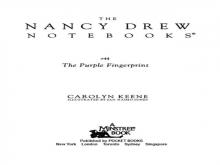 The Purple Fingerprint
The Purple Fingerprint The Picture of Guilt
The Picture of Guilt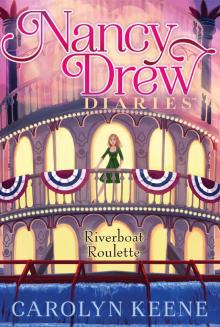 Riverboat Roulette
Riverboat Roulette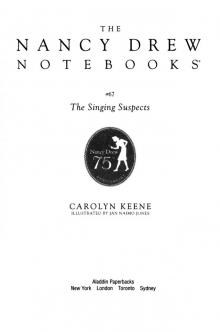 The Singing Suspects
The Singing Suspects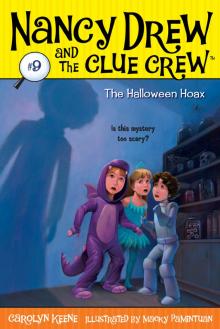 The Halloween Hoax
The Halloween Hoax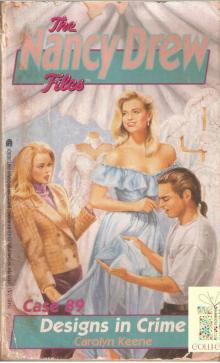 089 Designs in Crime
089 Designs in Crime The Hidden Treasures
The Hidden Treasures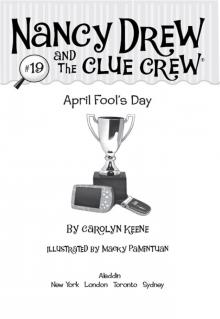 April Fool's Day
April Fool's Day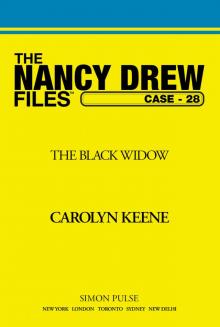 The Black Widow
The Black Widow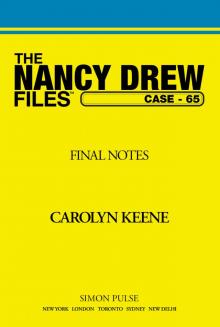 Final Notes
Final Notes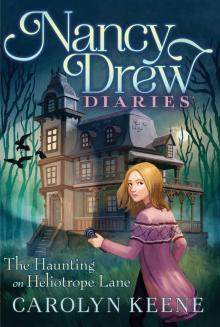 The Haunting on Heliotrope Lane
The Haunting on Heliotrope Lane The Runaway Bride
The Runaway Bride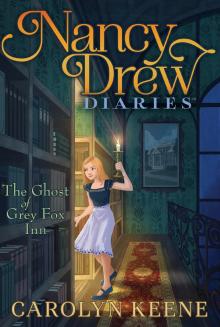 The Ghost of Grey Fox Inn
The Ghost of Grey Fox Inn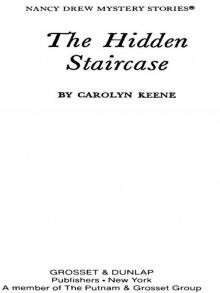 The Hidden Staircase
The Hidden Staircase Mystery of the Winged Lion
Mystery of the Winged Lion Over the Edge
Over the Edge The Circus Scare
The Circus Scare The Mystery of the Brass-Bound Trunk
The Mystery of the Brass-Bound Trunk Ski School Sneak
Ski School Sneak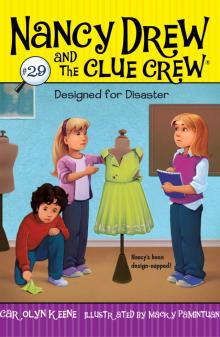 Designed for Disaster
Designed for Disaster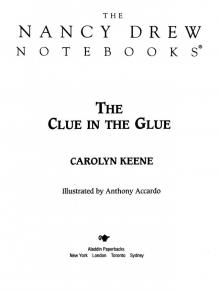 The Clue in the Glue
The Clue in the Glue Cold as Ice
Cold as Ice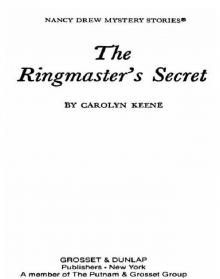 The Ringmaster's Secret
The Ringmaster's Secret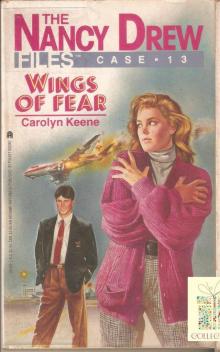 013 Wings of Fear
013 Wings of Fear The Secret of Shadow Ranch
The Secret of Shadow Ranch Not Nice on Ice
Not Nice on Ice Earth Day Escapade
Earth Day Escapade Mystery of Crocodile Island
Mystery of Crocodile Island The Bungalow Mystery
The Bungalow Mystery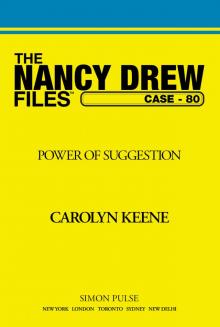 Power of Suggestion
Power of Suggestion The Lemonade Raid
The Lemonade Raid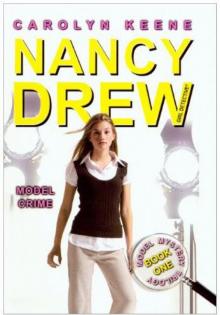 Model Crime
Model Crime The Lucky Horseshoes
The Lucky Horseshoes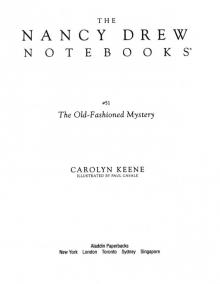 The Secret of the Old Clock
The Secret of the Old Clock The Clue at Black Creek Farm
The Clue at Black Creek Farm Pure Poison
Pure Poison Nobody's Business
Nobody's Business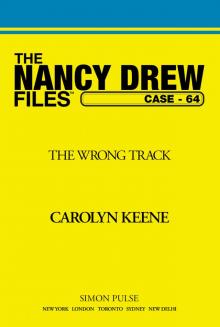 Wrong Track
Wrong Track Chick-Napped!
Chick-Napped!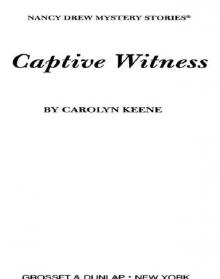 Captive Witness
Captive Witness If Looks Could Kill
If Looks Could Kill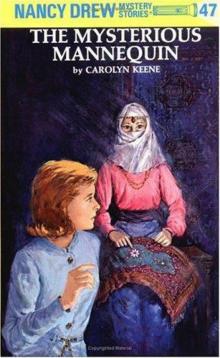 The Mysterious Mannequin
The Mysterious Mannequin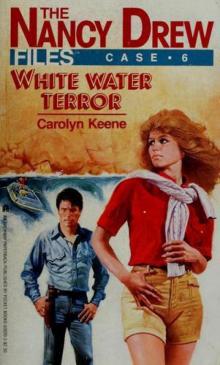 White Water Terror
White Water Terror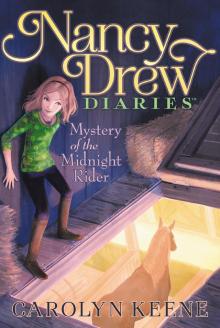 Mystery of the Midnight Rider
Mystery of the Midnight Rider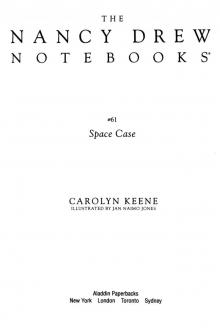 Space Case
Space Case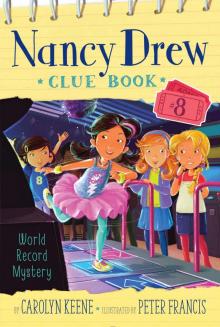 World Record Mystery
World Record Mystery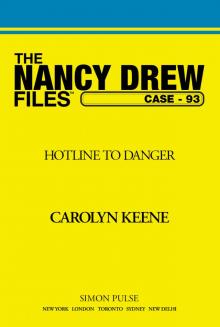 Hotline to Danger
Hotline to Danger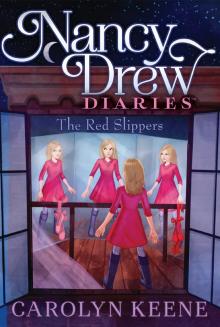 The Red Slippers
The Red Slippers A Crime for Christmas
A Crime for Christmas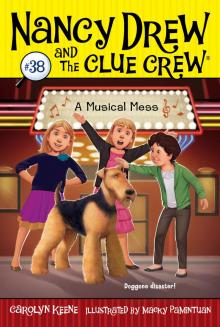 A Musical Mess
A Musical Mess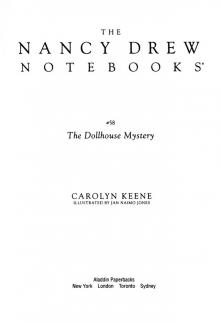 The Dollhouse Mystery
The Dollhouse Mystery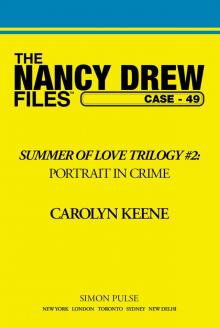 Portrait in Crime
Portrait in Crime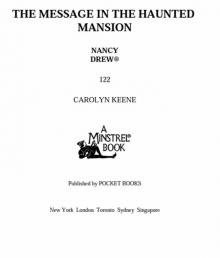 The Message in the Haunted Mansion
The Message in the Haunted Mansion Playing With Fire
Playing With Fire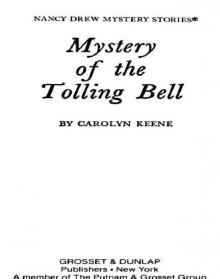 Mystery of the Tolling Bell
Mystery of the Tolling Bell Cutting Edge
Cutting Edge The Gumdrop Ghost
The Gumdrop Ghost The Message in the Hollow Oak
The Message in the Hollow Oak Trial by Fire
Trial by Fire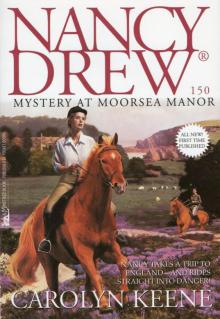 Mystery at Moorsea Manor
Mystery at Moorsea Manor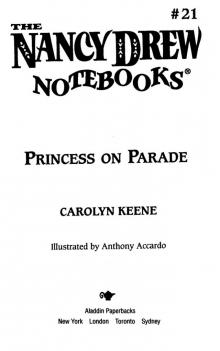 Princess on Parade
Princess on Parade The Flying Saucer Mystery
The Flying Saucer Mystery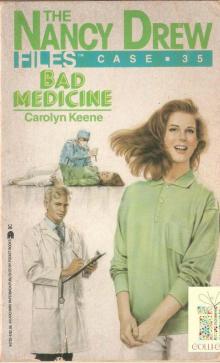 035 Bad Medicine
035 Bad Medicine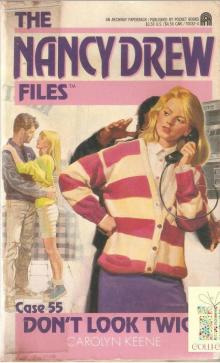 055 Don't Look Twice
055 Don't Look Twice The Haunted Showboat
The Haunted Showboat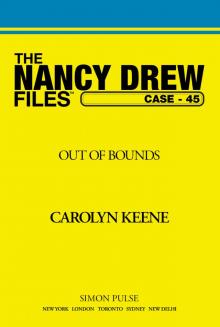 Out of Bounds
Out of Bounds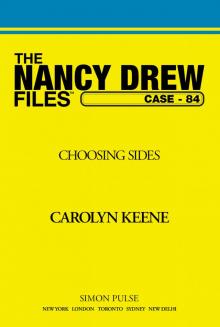 Choosing Sides
Choosing Sides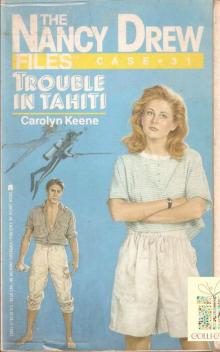 031 Trouble in Tahiti
031 Trouble in Tahiti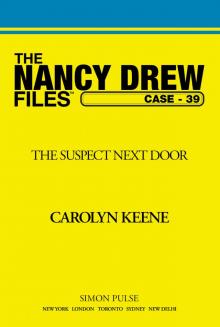 The Suspect Next Door
The Suspect Next Door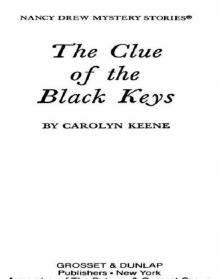 The Clue of the Black Keys
The Clue of the Black Keys The Secret Santa
The Secret Santa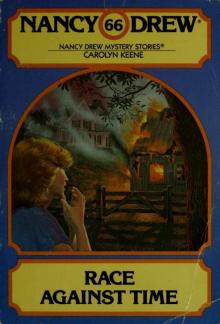 Race Against Time
Race Against Time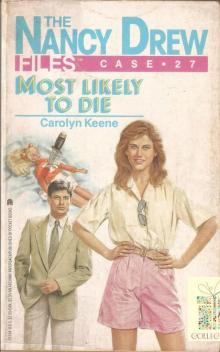 027 Most Likely to Die
027 Most Likely to Die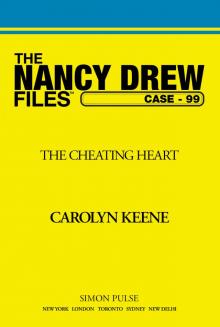 The Cheating Heart
The Cheating Heart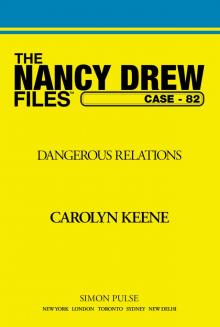 Dangerous Relations
Dangerous Relations It's No Joke!
It's No Joke! The Mystery of the Mother Wolf
The Mystery of the Mother Wolf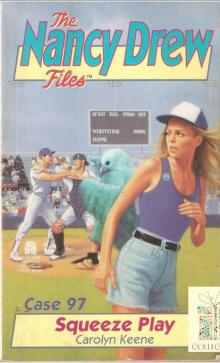 097 Squeeze Play
097 Squeeze Play Secret at Mystic Lake
Secret at Mystic Lake The Double Jinx Mystery
The Double Jinx Mystery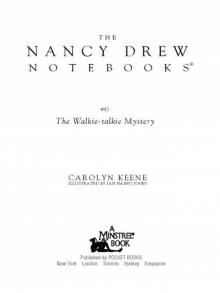 The Walkie Talkie Mystery
The Walkie Talkie Mystery The Case of the Vanishing Veil
The Case of the Vanishing Veil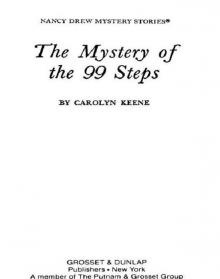 The Mystery of the 99 Steps
The Mystery of the 99 Steps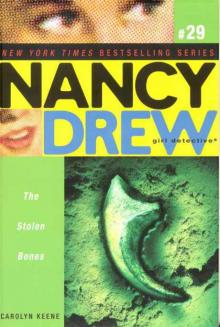 The Stolen Bones
The Stolen Bones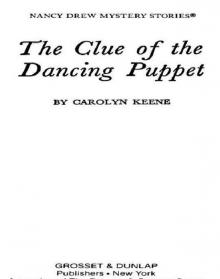 The Clue of the Dancing Puppet
The Clue of the Dancing Puppet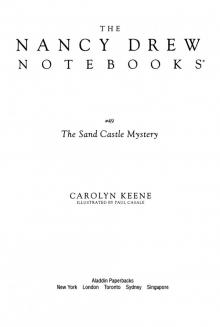 The Sand Castle Mystery
The Sand Castle Mystery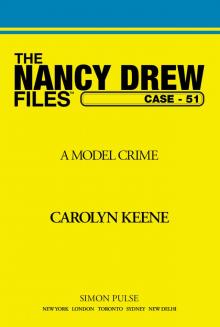 A Model Crime
A Model Crime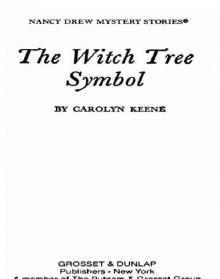 The Witch Tree Symbol
The Witch Tree Symbol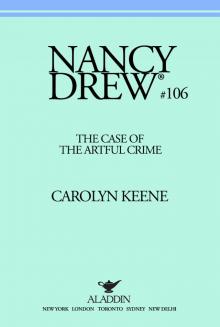 The Case of the Artful Crime
The Case of the Artful Crime Mall Madness
Mall Madness Swiss Secrets
Swiss Secrets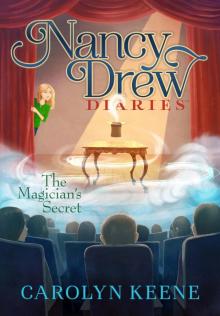 The Magician's Secret
The Magician's Secret Tall, Dark and Deadly
Tall, Dark and Deadly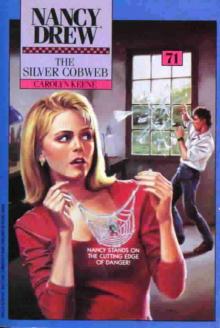 The Silver Cobweb
The Silver Cobweb The Clue of the Gold Doubloons
The Clue of the Gold Doubloons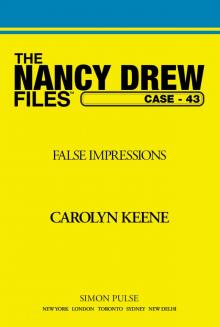 False Impressions
False Impressions Model Suspect
Model Suspect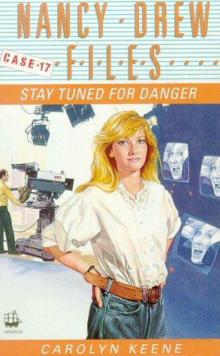 Stay Tuned for Danger
Stay Tuned for Danger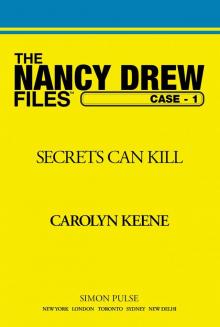 Secrets Can Kill
Secrets Can Kill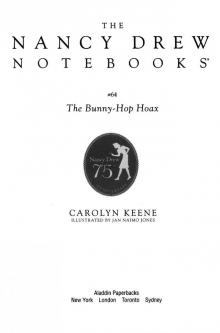 The Bunny-Hop Hoax
The Bunny-Hop Hoax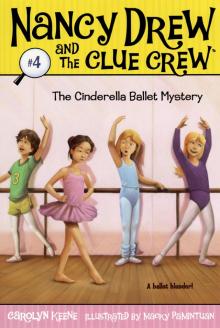 The Cinderella Ballet Mystery
The Cinderella Ballet Mystery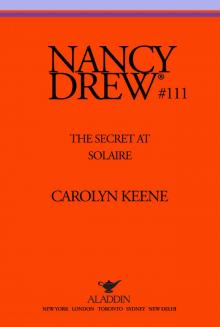 The Secret at Solaire
The Secret at Solaire Trash or Treasure?
Trash or Treasure? The Missing Horse Mystery
The Missing Horse Mystery The Lost Locket
The Lost Locket The Secret of the Wooden Lady
The Secret of the Wooden Lady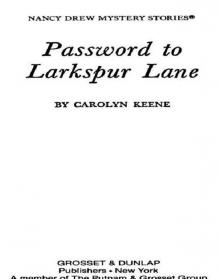 Password to Larkspur Lane
Password to Larkspur Lane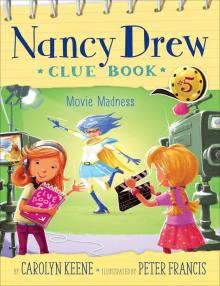 Movie Madness
Movie Madness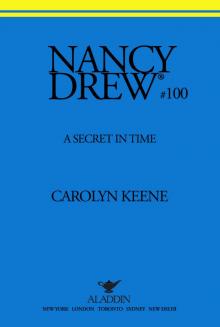 A Secret in Time
A Secret in Time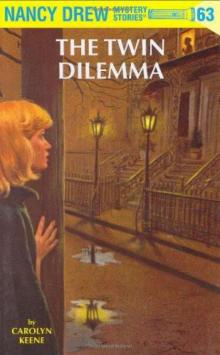 The Twin Dilemma
The Twin Dilemma Candy Is Dandy
Candy Is Dandy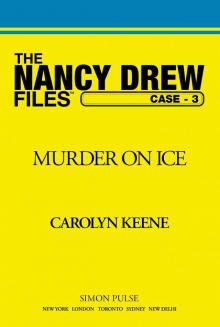 Murder on Ice
Murder on Ice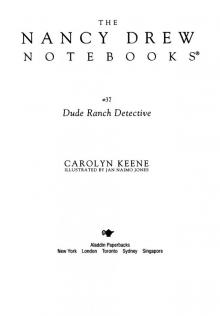 Dude Ranch Detective
Dude Ranch Detective The Slumber Party Secret
The Slumber Party Secret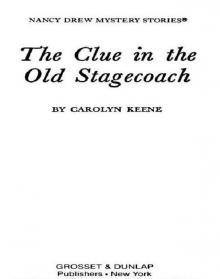 The Clue in the Old Stagecoach
The Clue in the Old Stagecoach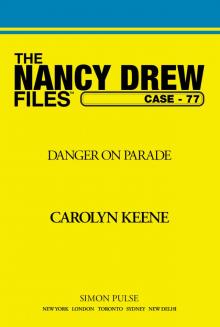 Danger on Parade
Danger on Parade Big Top Flop
Big Top Flop Strangers on a Train
Strangers on a Train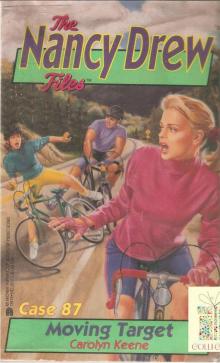 087 Moving Target
087 Moving Target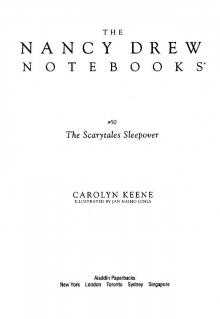 The Scarytales Sleepover
The Scarytales Sleepover The Mystery of the Fire Dragon
The Mystery of the Fire Dragon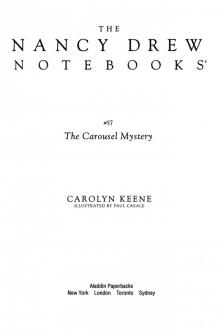 The Carousel Mystery
The Carousel Mystery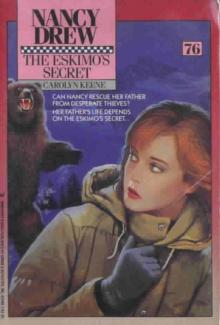 The Eskimo's Secret
The Eskimo's Secret Thrill on the Hill
Thrill on the Hill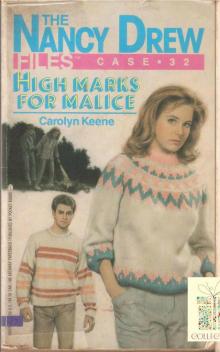 032 High Marks for Malice
032 High Marks for Malice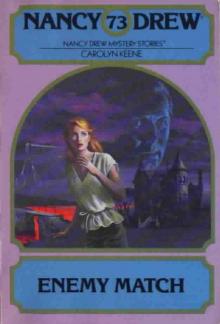 Enemy Match
Enemy Match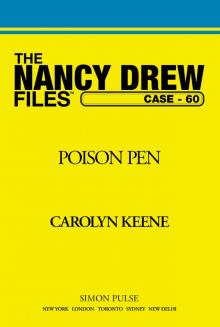 Poison Pen
Poison Pen Lights, Camera . . . Cats!
Lights, Camera . . . Cats! Lost in the Everglades
Lost in the Everglades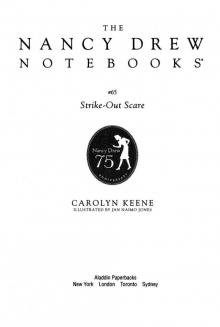 Strike-Out Scare
Strike-Out Scare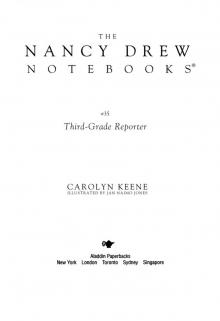 Third-Grade Reporter
Third-Grade Reporter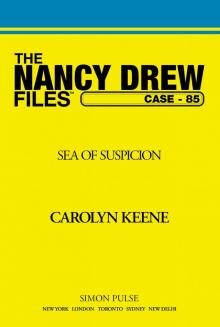 Sea of Suspicion
Sea of Suspicion Wedding Day Disaster
Wedding Day Disaster The Make-A-Pet Mystery
The Make-A-Pet Mystery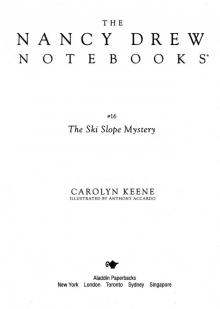 The Ski Slope Mystery
The Ski Slope Mystery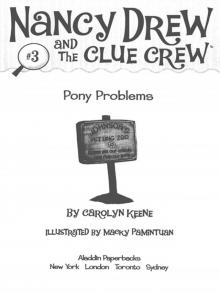 Pony Problems
Pony Problems Candy Kingdom Chaos
Candy Kingdom Chaos The Sign in the Smoke
The Sign in the Smoke The Wrong Chemistry
The Wrong Chemistry Circus Act
Circus Act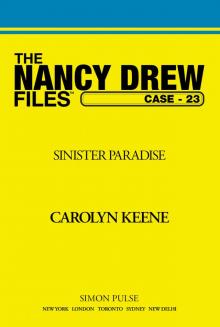 Sinister Paradise
Sinister Paradise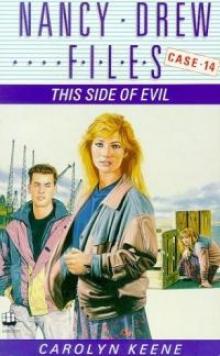 This Side of Evil
This Side of Evil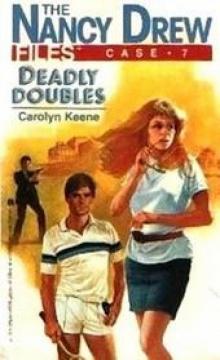 Deadly Doubles
Deadly Doubles The Mystery of the Masked Rider
The Mystery of the Masked Rider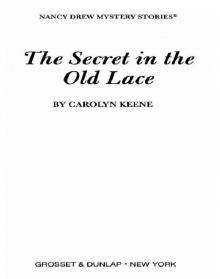 The Secret in the Old Lace
The Secret in the Old Lace The Pen Pal Puzzle
The Pen Pal Puzzle Without a Trace
Without a Trace Whose Pet Is Best?
Whose Pet Is Best?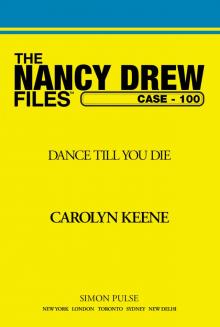 Dance Till You Die
Dance Till You Die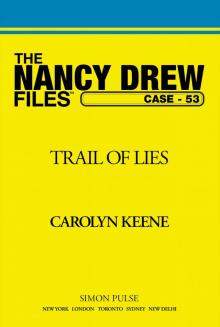 Trail of Lies
Trail of Lies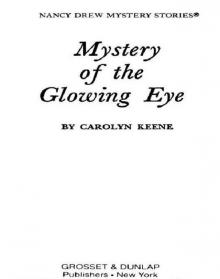 Mystery of the Glowing Eye
Mystery of the Glowing Eye The Clue of the Leaning Chimney
The Clue of the Leaning Chimney The Crook Who Took the Book
The Crook Who Took the Book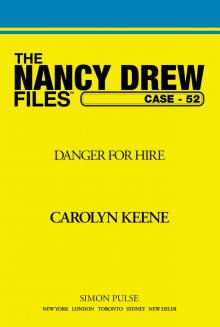 Danger for Hire
Danger for Hire Thanksgiving Thief
Thanksgiving Thief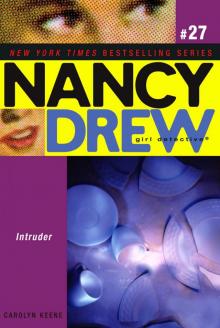 Intruder!
Intruder!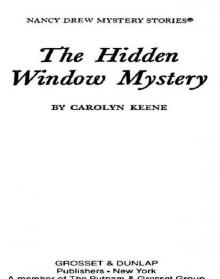 The Hidden Window Mystery
The Hidden Window Mystery Win, Place or Die
Win, Place or Die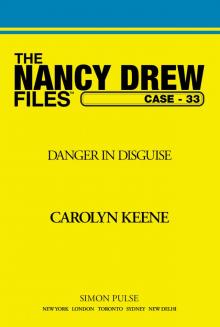 Danger in Disguise
Danger in Disguise The Best Detective
The Best Detective The Thanksgiving Surprise
The Thanksgiving Surprise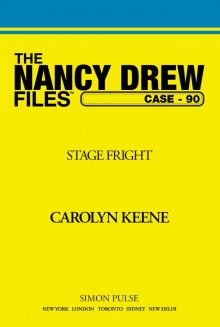 Stage Fright
Stage Fright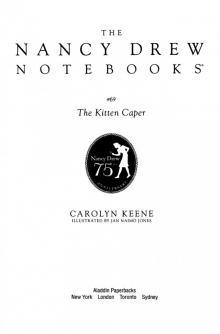 The Kitten Caper
The Kitten Caper Stolen Affections
Stolen Affections The Phantom of Nantucket
The Phantom of Nantucket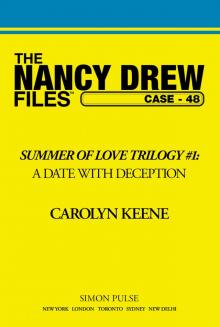 Date With Deception
Date With Deception Cooking Camp Disaster
Cooking Camp Disaster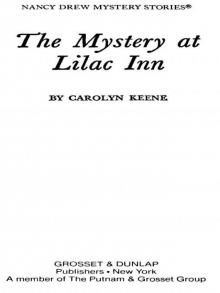 The Mystery at Lilac Inn
The Mystery at Lilac Inn Springtime Crime
Springtime Crime Action!
Action! Into Thin Air
Into Thin Air The Chocolate-Covered Contest
The Chocolate-Covered Contest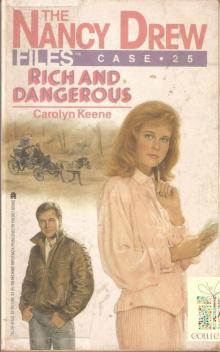 025 Rich and Dangerous
025 Rich and Dangerous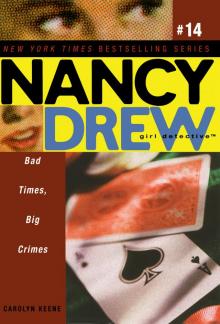 Bad Times, Big Crimes
Bad Times, Big Crimes 078 The Phantom Of Venice
078 The Phantom Of Venice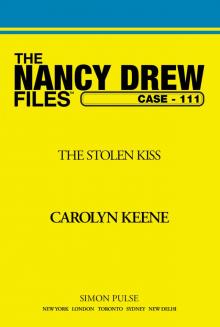 The Stolen Kiss
The Stolen Kiss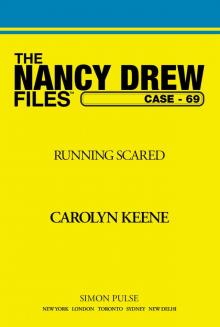 Running Scared
Running Scared The Wedding Gift Goof
The Wedding Gift Goof Time Thief
Time Thief The Phantom of Pine Hill
The Phantom of Pine Hill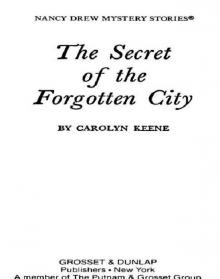 The Secret of the Forgotten City
The Secret of the Forgotten City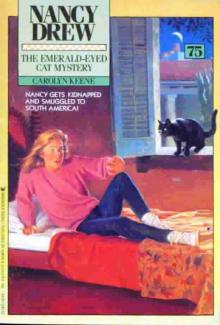 The Emerald-Eyed Cat Mystery
The Emerald-Eyed Cat Mystery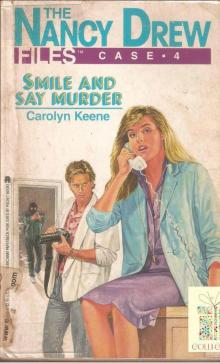 004 Smile and Say Murder
004 Smile and Say Murder Curse of the Arctic Star
Curse of the Arctic Star Dinosaur Alert!
Dinosaur Alert!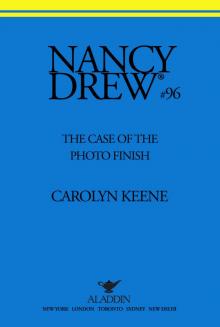 The Case of the Photo Finish
The Case of the Photo Finish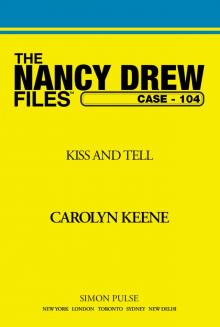 Kiss and Tell
Kiss and Tell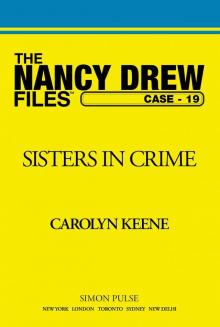 Sisters in Crime
Sisters in Crime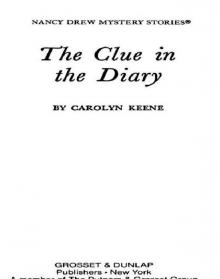 The Clue in the Diary
The Clue in the Diary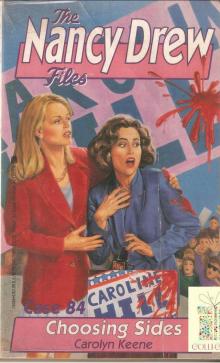 084 Choosing Sides
084 Choosing Sides Haunting of Horse Island
Haunting of Horse Island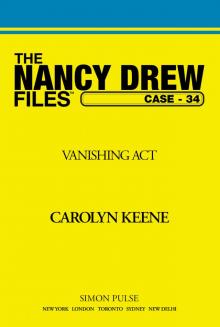 Vanishing Act
Vanishing Act The Big Island Burglary
The Big Island Burglary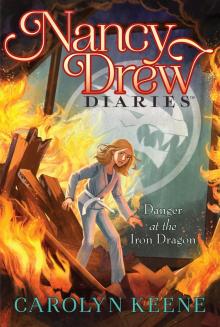 Danger at the Iron Dragon
Danger at the Iron Dragon Pets on Parade
Pets on Parade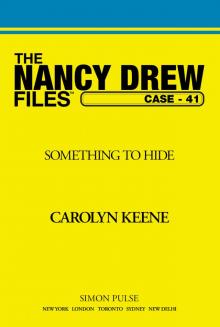 Something to Hide
Something to Hide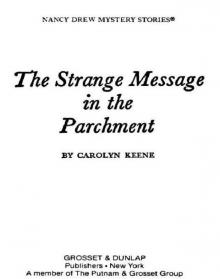 The Strange Message in the Parchment
The Strange Message in the Parchment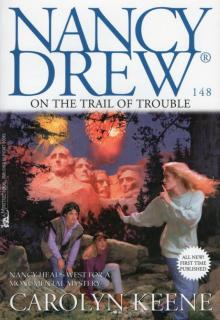 On the Trail of Trouble
On the Trail of Trouble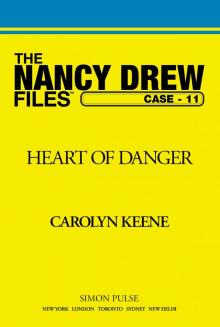 Heart of Danger
Heart of Danger The Snowman Surprise
The Snowman Surprise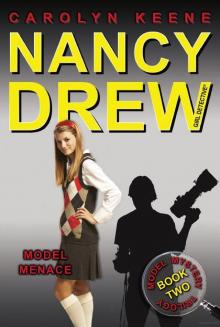 Model Menace
Model Menace Flower Power
Flower Power The Great Goat Gaffe
The Great Goat Gaffe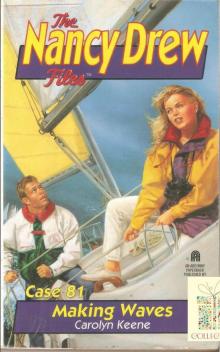 081 Making Waves
081 Making Waves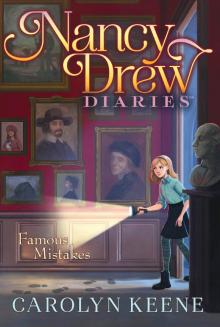 Famous Mistakes
Famous Mistakes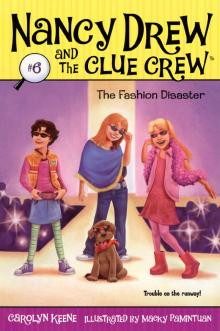 The Fashion Disaster
The Fashion Disaster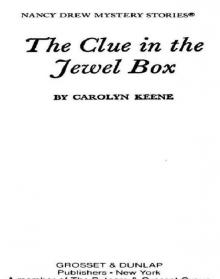 The Clue in the Jewel Box
The Clue in the Jewel Box The Clue of the Whistling Bagpipes
The Clue of the Whistling Bagpipes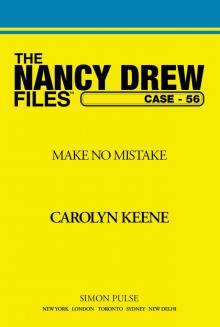 Make No Mistake
Make No Mistake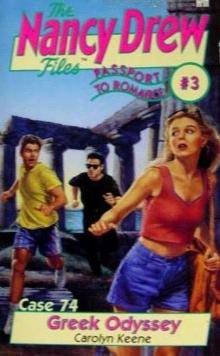 Greek Odyssey
Greek Odyssey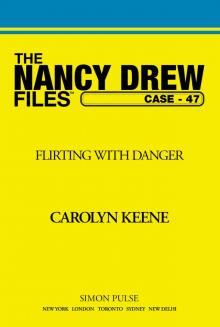 Flirting With Danger
Flirting With Danger Double Take
Double Take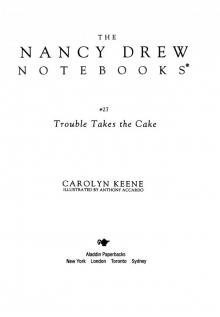 Trouble Takes the Cake
Trouble Takes the Cake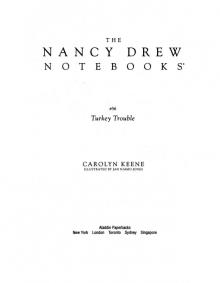 Turkey Trouble
Turkey Trouble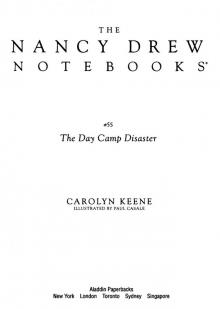 The Day Camp Disaster
The Day Camp Disaster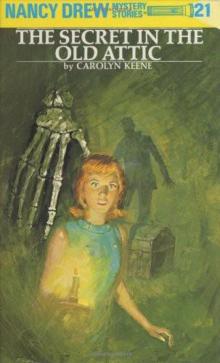 The Secret in the Old Attic
The Secret in the Old Attic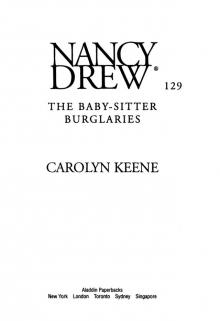 The Baby-Sitter Burglaries
The Baby-Sitter Burglaries Recipe for Murder
Recipe for Murder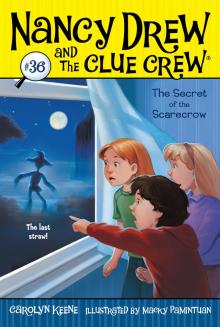 The Secret of the Scarecrow
The Secret of the Scarecrow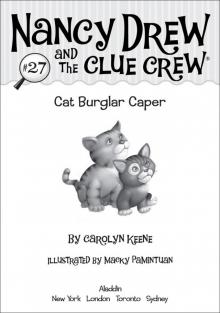 Cat Burglar Caper
Cat Burglar Caper Turkey Trot Plot
Turkey Trot Plot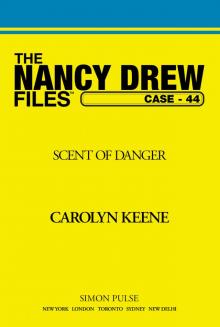 Scent of Danger
Scent of Danger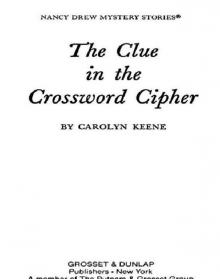 The Clue in the Crossword Cipher
The Clue in the Crossword Cipher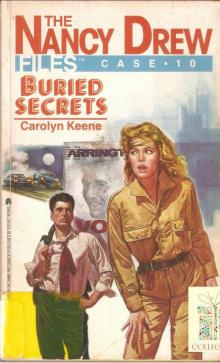 010 Buried Secrets
010 Buried Secrets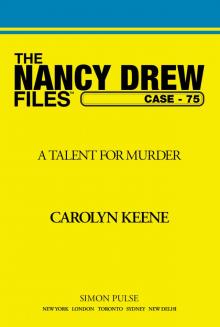 A Talent for Murder
A Talent for Murder The Triple Hoax
The Triple Hoax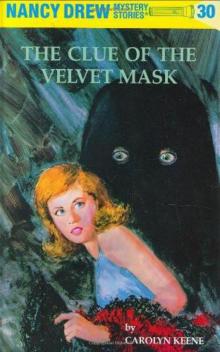 The Clue of the Velvet Mask
The Clue of the Velvet Mask Last Lemonade Standing
Last Lemonade Standing The Ghost of Blackwood Hall
The Ghost of Blackwood Hall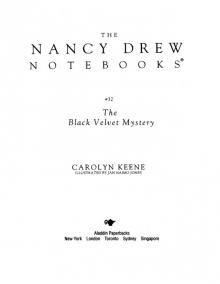 The Black Velvet Mystery
The Black Velvet Mystery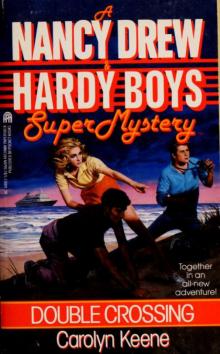 Double Crossing
Double Crossing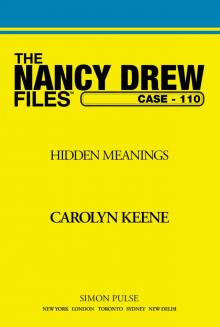 Hidden Meanings
Hidden Meanings Trouble at Camp Treehouse
Trouble at Camp Treehouse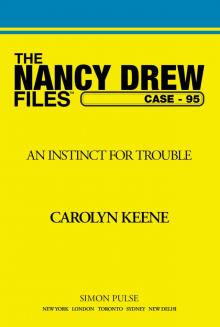 An Instinct for Trouble
An Instinct for Trouble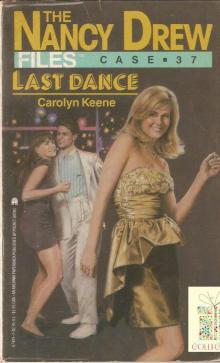 037 Last Dance
037 Last Dance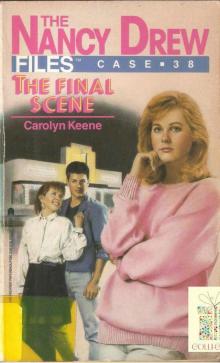 038 The Final Scene
038 The Final Scene Duck Derby Debacle
Duck Derby Debacle The Pumpkin Patch Puzzle
The Pumpkin Patch Puzzle Hidden Pictures
Hidden Pictures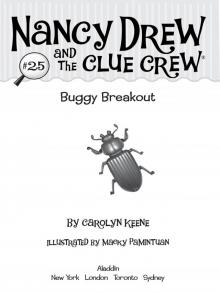 Buggy Breakout
Buggy Breakout California Schemin'
California Schemin'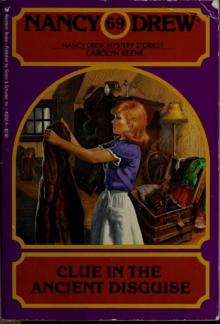 Clue in the Ancient Disguise
Clue in the Ancient Disguise Case of the Sneaky Snowman
Case of the Sneaky Snowman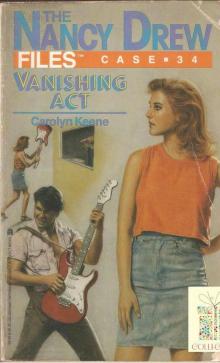 034 Vanishing Act
034 Vanishing Act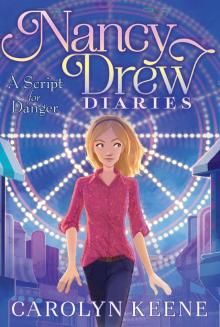 A Script for Danger
A Script for Danger The Flower Show Fiasco
The Flower Show Fiasco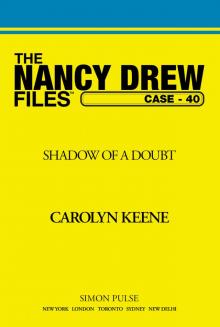 Shadow of a Doubt
Shadow of a Doubt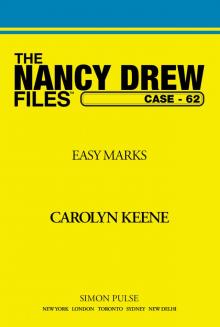 Easy Marks
Easy Marks Alien in the Classroom
Alien in the Classroom Ghost Stories, #2 (Nancy Drew)
Ghost Stories, #2 (Nancy Drew)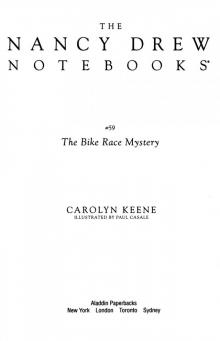 The Bike Race Mystery
The Bike Race Mystery False Pretenses
False Pretenses The Kachina Doll Mystery
The Kachina Doll Mystery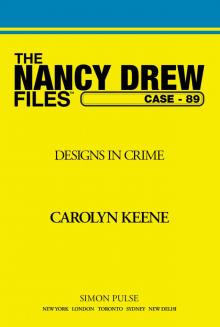 Designs in Crime
Designs in Crime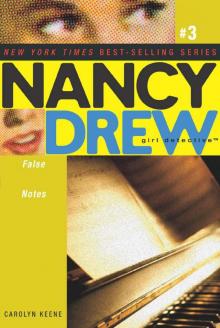 False Notes
False Notes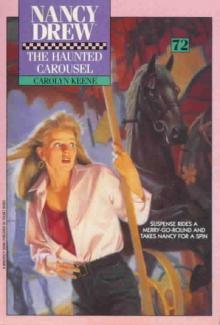 The Haunted Carousel
The Haunted Carousel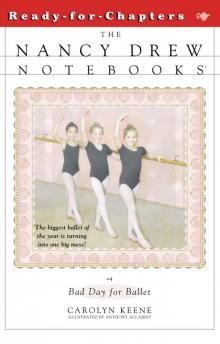 Bad Day for Ballet
Bad Day for Ballet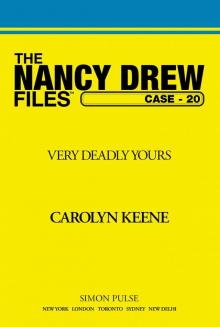 Very Deadly Yours
Very Deadly Yours The Fine-Feathered Mystery
The Fine-Feathered Mystery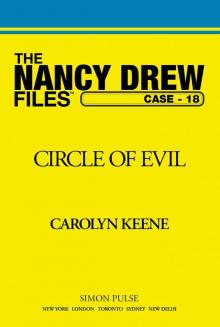 Circle of Evil
Circle of Evil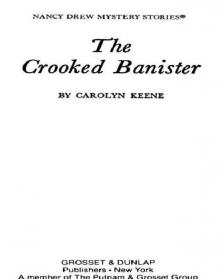 The Crooked Banister
The Crooked Banister 005 Hit and Run Holiday
005 Hit and Run Holiday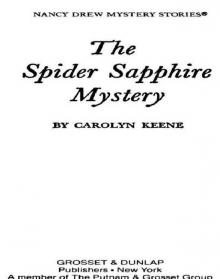 The Spider Sapphire Mystery
The Spider Sapphire Mystery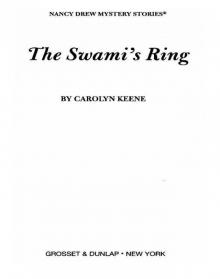 The Swami's Ring
The Swami's Ring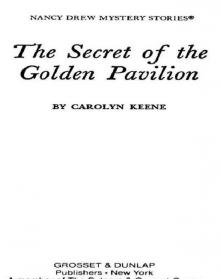 The Secret of the Golden Pavilion
The Secret of the Golden Pavilion Recipe for Trouble
Recipe for Trouble Betrayed by Love
Betrayed by Love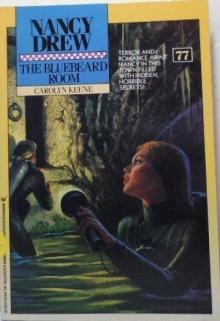 The Bluebeard Room
The Bluebeard Room Sweet Revenge
Sweet Revenge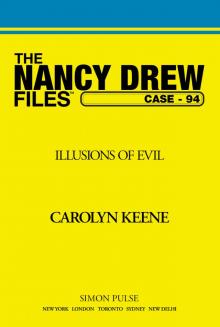 Illusions of Evil
Illusions of Evil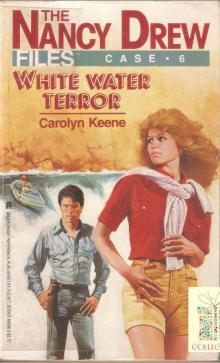 006 White Water Terror
006 White Water Terror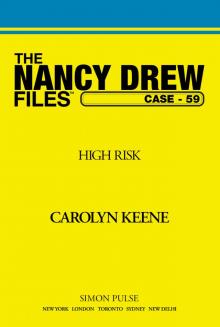 High Risk
High Risk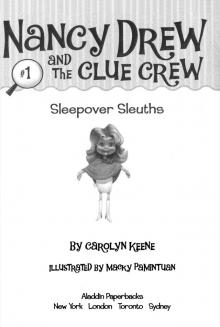 Sleepover Sleuths
Sleepover Sleuths The Clue on the Crystal Dove
The Clue on the Crystal Dove The Stolen Unicorn
The Stolen Unicorn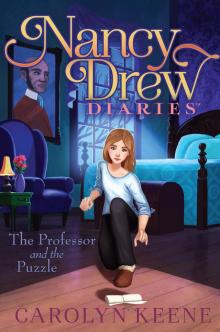 The Professor and the Puzzle
The Professor and the Puzzle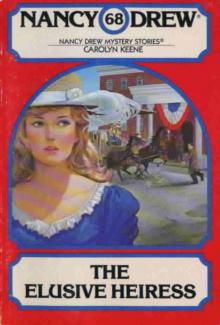 The Elusive Heiress
The Elusive Heiress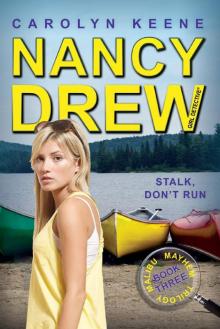 Stalk, Don't Run
Stalk, Don't Run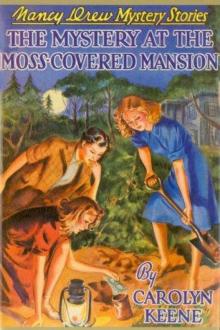 The Mystery at the Moss-Covered Mansion
The Mystery at the Moss-Covered Mansion The Tortoise and the Scare
The Tortoise and the Scare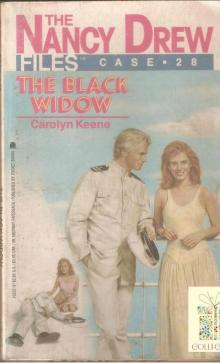 028 The Black Widow
028 The Black Widow Big Worry in Wonderland
Big Worry in Wonderland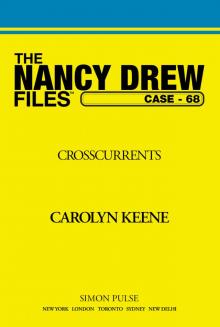 Crosscurrents
Crosscurrents The Dashing Dog Mystery
The Dashing Dog Mystery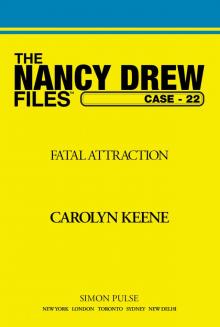 Fatal Attraction
Fatal Attraction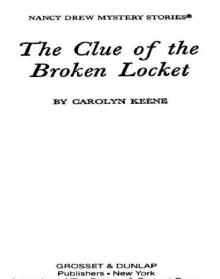 The Clue of the Broken Locket
The Clue of the Broken Locket The Stinky Cheese Surprise
The Stinky Cheese Surprise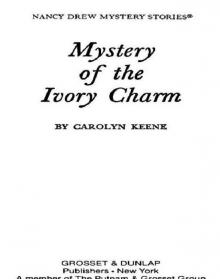 Mystery of the Ivory Charm
Mystery of the Ivory Charm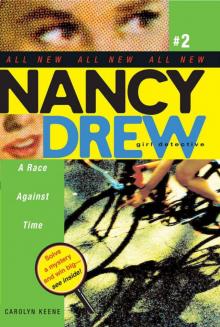 A Race Against Time
A Race Against Time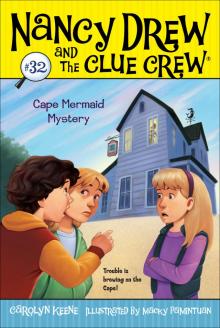 Cape Mermaid Mystery
Cape Mermaid Mystery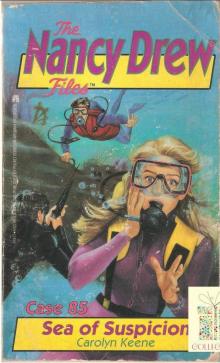 085 Sea of Suspicion
085 Sea of Suspicion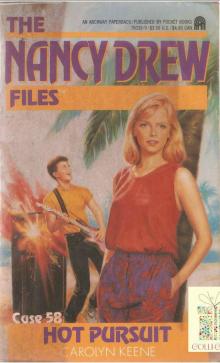 058 Hot Pursuit
058 Hot Pursuit The Secret in the Spooky Woods
The Secret in the Spooky Woods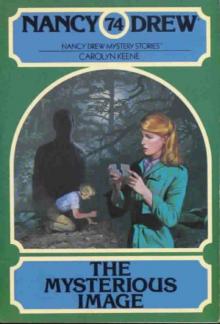 The Mysterious Image
The Mysterious Image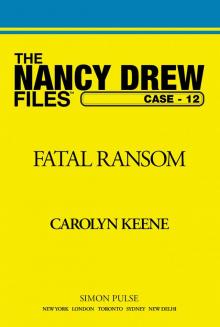 Fatal Ransom
Fatal Ransom The Stolen Show
The Stolen Show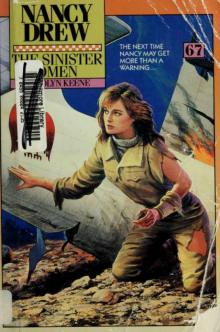 The Sinister Omen
The Sinister Omen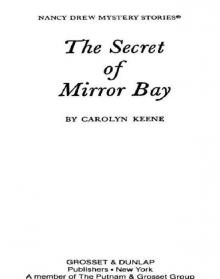 The Secret of Mirror Bay
The Secret of Mirror Bay Rendezvous in Rome
Rendezvous in Rome The Perfect Plot
The Perfect Plot The Mystery of Misty Canyon
The Mystery of Misty Canyon Nancy's Mysterious Letter
Nancy's Mysterious Letter The Snow Queen's Surprise
The Snow Queen's Surprise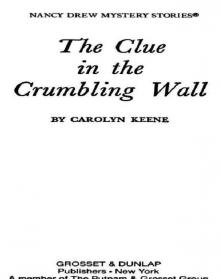 The Clue in the Crumbling Wall
The Clue in the Crumbling Wall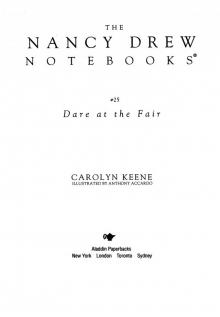 Dare at the Fair
Dare at the Fair Scream for Ice Cream
Scream for Ice Cream A Star Witness
A Star Witness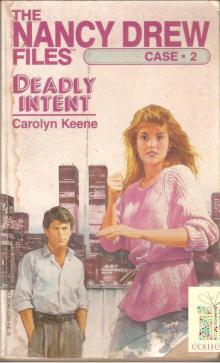 002 Deadly Intent
002 Deadly Intent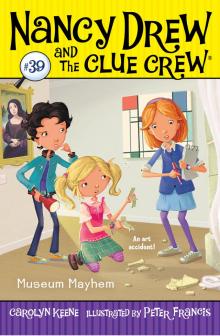 Museum Mayhem
Museum Mayhem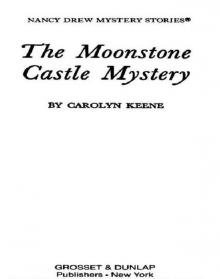 The Moonstone Castle Mystery
The Moonstone Castle Mystery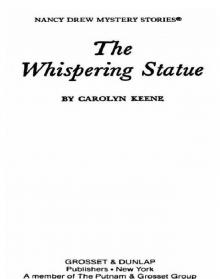 The Whispering Statue
The Whispering Statue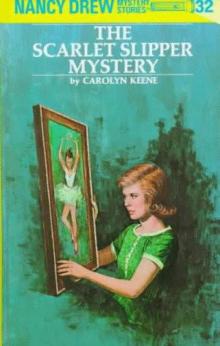 The Scarlet Slipper Mystery
The Scarlet Slipper Mystery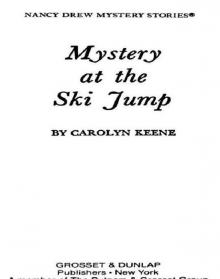 Mystery at the Ski Jump
Mystery at the Ski Jump Hot Pursuit
Hot Pursuit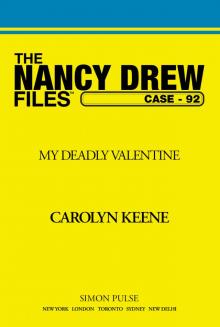 My Deadly Valentine
My Deadly Valentine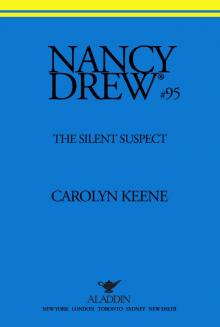 The Silent Suspect
The Silent Suspect Deep Secrets
Deep Secrets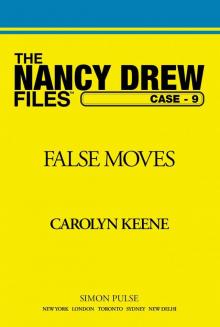 False Moves
False Moves The Zoo Crew
The Zoo Crew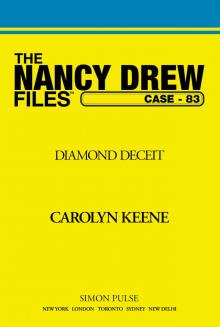 Diamond Deceit
Diamond Deceit The Sky Phantom
The Sky Phantom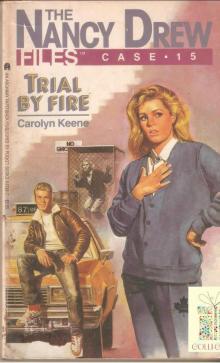 015 Trial by Fire
015 Trial by Fire The Quest of the Missing Map
The Quest of the Missing Map Babysitting Bandit
Babysitting Bandit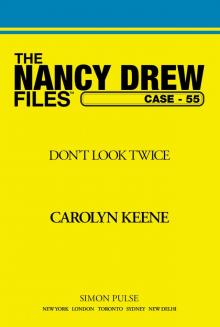 Don't Look Twice
Don't Look Twice Never Say Die
Never Say Die The Soccer Shoe Clue
The Soccer Shoe Clue Pool Party Puzzler
Pool Party Puzzler The Case of the Lost Song
The Case of the Lost Song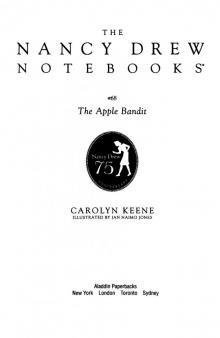 The Apple Bandit
The Apple Bandit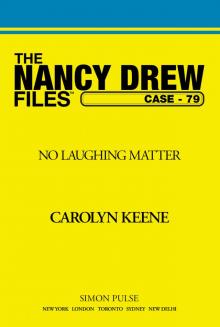 No Laughing Matter
No Laughing Matter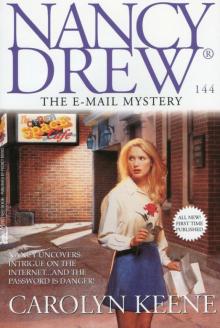 The Thirteenth Pearl
The Thirteenth Pearl Sabotage at Willow Woods
Sabotage at Willow Woods Butterfly Blues
Butterfly Blues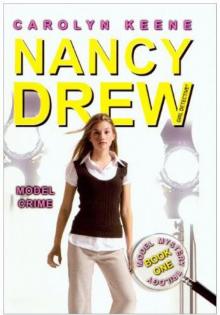 Model Crime 1
Model Crime 1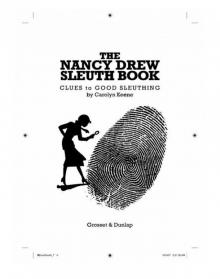 The Nancy Drew Sleuth Book
The Nancy Drew Sleuth Book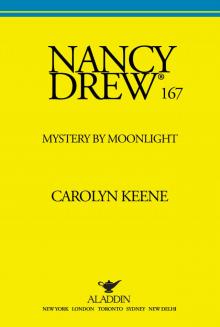 Mystery by Moonlight
Mystery by Moonlight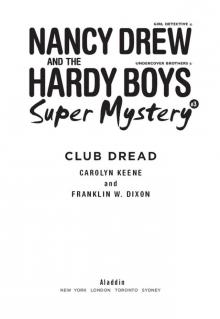 Club Dread
Club Dread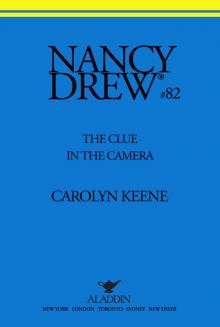 The Clue in the Camera
The Clue in the Camera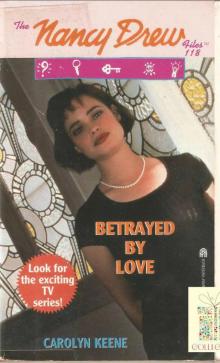 118 Betrayed By Love
118 Betrayed By Love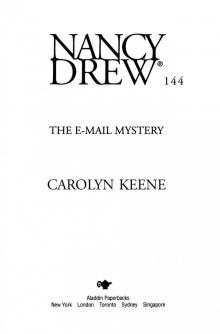 The E-Mail Mystery (Nancy Drew Book 144)
The E-Mail Mystery (Nancy Drew Book 144)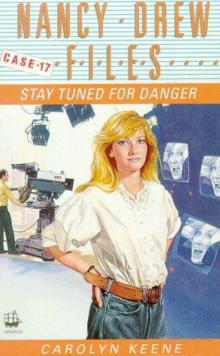 Stay Tuned for Danger: Circle of Evil
Stay Tuned for Danger: Circle of Evil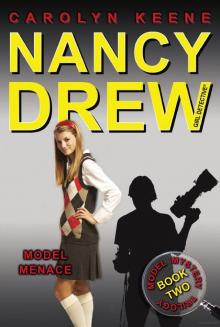 Model Menace 2
Model Menace 2 California Schemin': Book One in the Malibu Mayhem Trilogy
California Schemin': Book One in the Malibu Mayhem Trilogy Zoo Clue (Nancy Drew Notebooks)
Zoo Clue (Nancy Drew Notebooks)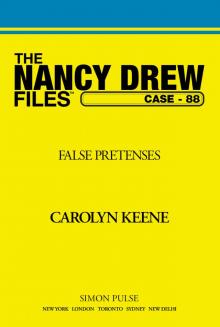 False Pretences
False Pretences 151 The Chocolate-Covered Contest
151 The Chocolate-Covered Contest Close Encounters
Close Encounters The Emeral-Eyed Cat Mystery
The Emeral-Eyed Cat Mystery Boo Crew
Boo Crew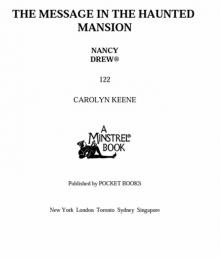 The Message in the Haunted Mansion (Nancy Drew Book 122)
The Message in the Haunted Mansion (Nancy Drew Book 122) A Nancy Drew Christmas
A Nancy Drew Christmas 149 The Clue Of The Gold Doubloons
149 The Clue Of The Gold Doubloons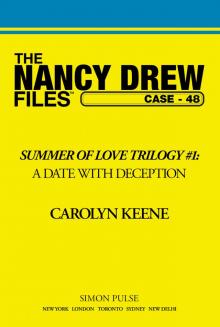 A Date with Deception
A Date with Deception 101 The Picture of Guilt
101 The Picture of Guilt The Secret in the Spooky Woods (Nancy Drew Notebooks Book 62)
The Secret in the Spooky Woods (Nancy Drew Notebooks Book 62)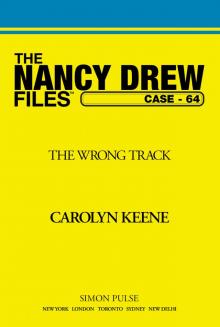 The Wrong Track
The Wrong Track Lights! Camera! Clues!
Lights! Camera! Clues!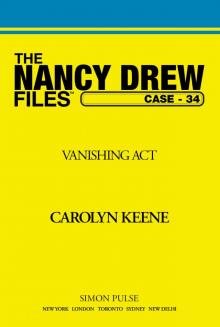 The Vanishing Act
The Vanishing Act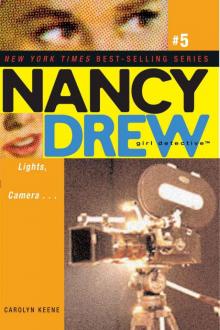 Lights, Camera . . .
Lights, Camera . . . Model Suspect 3
Model Suspect 3 160 The Clue On The Crystal Dove
160 The Clue On The Crystal Dove 163 The Clues Challenge
163 The Clues Challenge Ghost Stories (Nancy Drew)
Ghost Stories (Nancy Drew)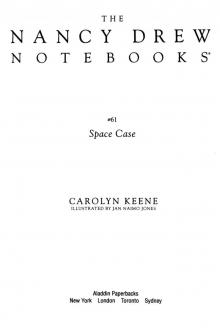 Space Case (Nancy Drew Notebooks Book 61)
Space Case (Nancy Drew Notebooks Book 61) 164 The Mystery Of The Mother Wolf
164 The Mystery Of The Mother Wolf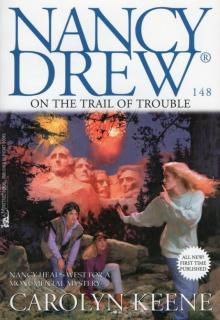 148 On The Trail Of Trouble
148 On The Trail Of Trouble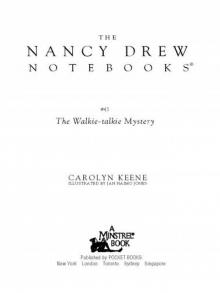 The Walkie-Talkie Mystery
The Walkie-Talkie Mystery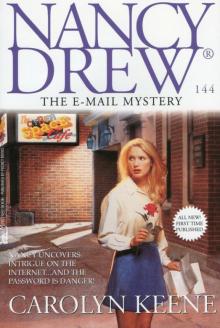 The E-Mail Mystery
The E-Mail Mystery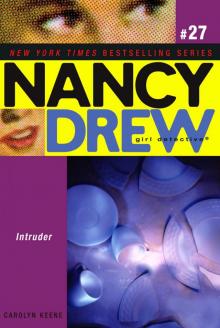 Intruder (Nancy Drew (All New) Girl Detective)
Intruder (Nancy Drew (All New) Girl Detective)![The Stolen Relic [Nancy Drew Girl Detective 007] Read online](http://i1.bookreadfree.com/i2/04/11/the_stolen_relic_nancy_drew_girl_detective_007_preview.jpg) The Stolen Relic [Nancy Drew Girl Detective 007]
The Stolen Relic [Nancy Drew Girl Detective 007] 105 Stolen Affections
105 Stolen Affections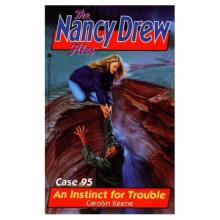 An Instict for Trouble
An Instict for Trouble 161 Lost In The Everglades
161 Lost In The Everglades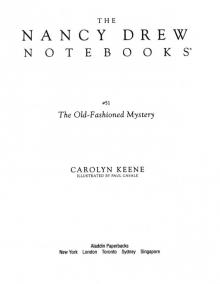 The Old-Fashioned Mystery
The Old-Fashioned Mystery Perfect Plot
Perfect Plot